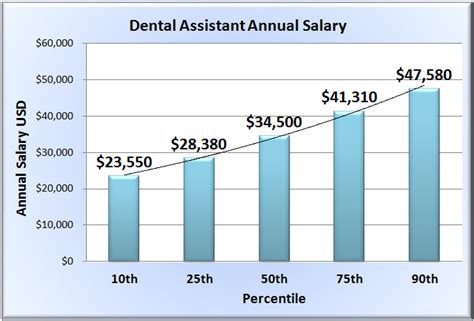Illinois Dental Assistant Salary

The role of a dental assistant is both rewarding and in demand, offering a unique blend of patient care, administrative tasks, and clinical support. In Illinois, the dental assistant profession has seen steady growth, driven by an aging population, increased access to dental care, and advancements in dental technology. This article delves into the Illinois dental assistant salary, exploring factors that influence earnings, regional variations, career pathways, and the broader context of the dental industry in the state.
Understanding the Role of a Dental Assistant

Before diving into salary specifics, it’s essential to understand the responsibilities of a dental assistant. These professionals work alongside dentists, performing tasks such as preparing patients for procedures, sterilizing instruments, taking X-rays, and managing patient records. In Illinois, dental assistants may also perform expanded functions if they meet additional certification requirements, such as the Certified Dental Assistant (CDA) credential from the Dental Assisting National Board (DANB).
Expert Insight: "Expanded functions certifications can significantly enhance a dental assistant’s earning potential by allowing them to take on more complex tasks, such as coronal polishing and sealant application," notes Dr. Emily Carter, a Chicago-based dentist.
Average Illinois Dental Assistant Salary

As of 2023, the average annual salary for dental assistants in Illinois is approximately $42,000, according to the Bureau of Labor Statistics (BLS). This figure places Illinois slightly above the national average of $41,180. However, salaries can vary widely based on factors such as experience, location, and specialization.
Key Takeaway: Entry-level dental assistants in Illinois typically earn between $32,000 and $36,000 annually, while experienced professionals with certifications can earn upwards of $50,000.
Factors Influencing Dental Assistant Salaries in Illinois
Experience and Education
Pro: Dental assistants with advanced certifications or degrees, such as an Associate of Applied Science in Dental Assisting, often command higher salaries.
Con: Entry-level positions may offer lower wages, requiring time and additional training to increase earnings.
Geographic Location
Pro: Urban areas like Chicago and Naperville tend to offer higher salaries due to a higher cost of living and greater demand for dental services.
Con: Rural areas may offer lower wages but often provide a better work-life balance and lower living costs.
Employer Type
Pro: Dental assistants working in specialized clinics, such as orthodontics or oral surgery, may earn more than those in general dentistry practices.
Con: Public health clinics or non-profit organizations may offer lower salaries but provide opportunities for community impact.
Regional Salary Variations in Illinois
Illinois’ diverse geography and economy contribute to regional salary variations. Below is a comparison of average dental assistant salaries in key Illinois cities:
| City | Average Annual Salary |
|---|---|
| Chicago | $45,000 |
| Aurora | $42,500 |
| Rockford | $39,000 |
| Springfield | $38,500 |
| Peoria | $37,000 |

Career Advancement Opportunities

Dental assistants in Illinois have several pathways to increase their earning potential:
- Specialization: Pursuing specialties like orthodontics, pediatric dentistry, or oral surgery can lead to higher salaries.
- Certifications: Obtaining certifications such as CDA, Certified Orthodontic Assistant (COA), or Certified Preventive Dental Assistant (CPDA) enhances skills and marketability.
- Continuing Education: Staying updated with the latest dental technologies and techniques can open doors to advanced roles and higher pay.
- Management Roles: Transitioning into office management or dental practice administration can significantly boost income.
The Future of Dental Assisting in Illinois
The demand for dental assistants in Illinois is projected to grow by 8% from 2022 to 2032, according to the BLS. This growth is driven by an aging population requiring more dental care, increased access to dental insurance, and advancements in dental technology. Additionally, the expansion of telehealth and teledentistry may create new opportunities for dental assistants to support remote patient care.
Future Implications: As the dental industry evolves, dental assistants with digital literacy and teledentistry skills will be highly sought after, potentially commanding higher salaries.
Frequently Asked Questions
What is the starting salary for a dental assistant in Illinois?
+Entry-level dental assistants in Illinois typically earn between $32,000 and $36,000 annually, depending on location and employer.
Do dental assistants in Chicago earn more than those in rural Illinois?
+Yes, dental assistants in urban areas like Chicago generally earn higher salaries due to the higher cost of living and greater demand for dental services.
How can I increase my salary as a dental assistant in Illinois?
+Pursuing advanced certifications, specializing in a specific area of dentistry, and gaining experience can significantly increase your earning potential.
Are there opportunities for dental assistants to work remotely in Illinois?
+While traditional dental assisting roles are hands-on, the rise of teledentistry may create remote opportunities for administrative or patient coordination tasks.
What is the job outlook for dental assistants in Illinois?
+The job outlook is positive, with an expected 8% growth rate from 2022 to 2032, driven by increased demand for dental care and advancements in technology.
Conclusion
The Illinois dental assistant salary reflects the state’s robust dental industry and the critical role these professionals play in patient care. With an average salary of $42,000 and ample opportunities for advancement, dental assisting offers a stable and rewarding career path. Whether working in bustling Chicago or a quiet rural town, dental assistants in Illinois can expect competitive compensation and a bright future in a growing field. By investing in education, certifications, and specialized skills, dental assistants can maximize their earning potential and contribute meaningfully to oral healthcare in the Prairie State.


